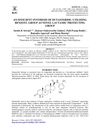Search
for
Sort by
Research
330-360 / 1000+ resultsresearch Androgenetic Alopecia: Pathophysiological Aspects in Man and Animals
![Activity of 17β-(N-Alkyl/Arylformamido) and 17β-[(N-Alkyl/Aryl) Alkyl/Arylamido]-4-Methyl-4-Aza-5α-Androstan-3-Ones as 5α-Reductase Inhibitors in the Hamster Flank Organ and Ear](/images/research/861159f1-7bd4-420c-a16b-4829458efe68/small/15592.jpg)
research Activity of 17β-(N-Alkyl/Arylformamido) and 17β-[(N-Alkyl/Aryl) Alkyl/Arylamido]-4-Methyl-4-Aza-5α-Androstan-3-Ones as 5α-Reductase Inhibitors in the Hamster Flank Organ and Ear
The compounds tested could potentially treat hair loss and alopecia.

research Cloning of a Functional Vitamin D Receptor from the Lamprey, an Ancient Vertebrate Lacking a Calcified Skeleton and Teeth
Lampreys have a functional vitamin D receptor that may help detoxify harmful substances.

research Skin Steroidogenesis in Health and Disease
The skin's ability to produce hormones is linked to various skin conditions, and better understanding this process could lead to new treatments.

research 25 Years of Estrogen Receptor Beta: A Personal Journey
ERβ has potential in treating prostate cancer and neurodegenerative diseases, but human studies are needed before clinical use.

research Male Pattern Hair Loss: Current Understanding
Genetics and hormones cause hair loss; finasteride treats it safely.

research Effect of Testosterone Supplementation With and Without a Dual 5α-Reductase Inhibitor on Fat-Free Mass in Men With Suppressed Testosterone Production
Testosterone's muscle-building effects do not require its conversion to DHT.

research Enzyme-Linked Immunosorbent Assays for Doping Control of 5α-Reductase Inhibitors Finasteride and Dutasteride
New tests detect finasteride and dutasteride in urine quickly and easily.

research Clinical Relevance of Testosterone and Dihydrotestosterone Metabolism in Women
Testosterone and dihydrotestosterone play a role in women's health issues like excess hair and baldness, and treatments blocking these hormones may help.

research An Efficient Synthesis of Dutasteride: Utilizing Benzoyl Group as Novel Lactamic Protecting Group
Researchers created a new, efficient way to make Dutasteride, a hair loss and prostate drug, with high purity using a benzoyl group.

research Inhibition of Rat Alpha-Reductases by Finasteride: Evidence for Isozyme Differences in the Mechanism of Inhibition
Finasteride effectively blocks rat enzymes, but with varying methods and strength.

research The Hair Follicle: A Paradoxical Androgen Target Organ
Androgens can both promote and prevent hair growth due to differences in gene expression in hair follicles.

research Comparison of High-Dose Finasteride (5 mg/day) Versus Low-Dose Finasteride (2.5 mg/day) in the Treatment of Hirsutism
Low-dose finasteride effectively treats hirsutism, is safe, and cost-effective.

research Caspase-1 Level Is Higher in the Scalp in Androgenetic Alopecia
Higher caspase-1 levels found in balding scalps; reducing it may help treat hair loss.

research Hormones and Hair Growth
Different hormones affect hair growth and conditions, with some causing hair loss and others promoting it.

research Synthesis and Biological Evaluation of Novel Unsaturated Carboxysteroids as Human 5α-Reductase Inhibitors: A Legitimate Approach
New steroid compounds effectively inhibit 5α-reductase and may treat hair loss.

research Post-Finasteride Syndrome – Does It Really Exist?
Post-finasteride syndrome's existence is uncertain; more research needed.

research Effect of Solvent on Stereoselectivity in Pd/C (Type 39K)-Catalyzed Hydrogenation of Methyl 3-Oxo-4-Aza-5-Androstene-17-Carboxylate, a Key Intermediate for Finasteride and Dutasteride
Alcoholic solvent improves selectivity in key intermediate for finasteride and dutasteride synthesis.

research Cutaneous Manifestations of Polycystic Ovary Syndrome
Skin problems in PCOS, like excess hair, acne, and hair loss, may not always indicate high male hormone levels and need careful diagnosis for proper treatment.

research Reaction of Finasteride Intermediate with Benzeneseleninic Anhydride: An In-Depth Study
Impure benzeneseleninic anhydride samples cause lower finasteride intermediate yields.

research Androgenic Alopecia: Cross-Talk Between Cell Signal Transduction Pathways
Hair loss in Androgenetic alopecia (AGA) is due to altered cell sensitivity to hormones, not increased hormone levels. Hair growth periods shorten over time, causing hair to become thinner and shorter. This is linked to miscommunication between cell pathways in hair follicles. There's also a change in gene expression related to blood vessels and cell growth in balding hair follicles. The exact molecular causes of AGA are still unclear.

research Steroid Sulfatase: Molecular Biology, Regulation, and Inhibition
The enzyme steroid sulfatase is linked to breast cancer and other conditions, and inhibitors are being developed for treatment.

research Biology of Estrogens in Skin: Implications for Skin Aging
Estrogens can improve skin aging but carry risks; more research is needed on safer treatments.

research Safety of Testosterone Treatment in Postmenopausal Women
Testosterone therapy seems safe for postmenopausal women for a few years, but more research is needed for long-term effects.

research Hidradenitis Suppurativa: An Androgen-Dependent Disorder
Hidradenitis suppurativa improves with antiandrogen therapy.

research PNU 157706, A Novel Dual Type I and II 5α-Reductase Inhibitor
PNU 157706 is a more effective treatment than finasteride for conditions caused by DHT, like enlarged prostate and hair loss.

research In Vitro Main Pathways of Steroid Action in Cultured Hair Follicle Cells: Vascular Approach
Steroids, particularly estrogens and 5α-reductase inhibitors, affect blood vessel-related hair growth processes in hair follicle cells.

research Androgenetic Alopecia: In Vivo Models
Stump-tailed macaque best for researching hair loss causes and treatments.

research Gilles De La Tourette Syndrome – A Treatable Condition?
Gilles de la Tourette syndrome is treatable, with behavioral therapy as a recommended first option and other treatments available for more severe cases.